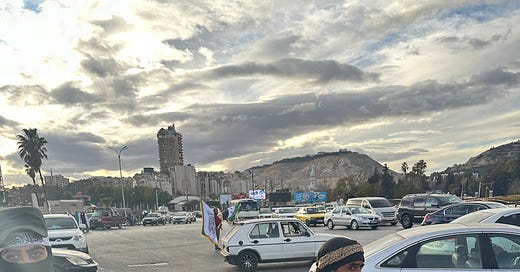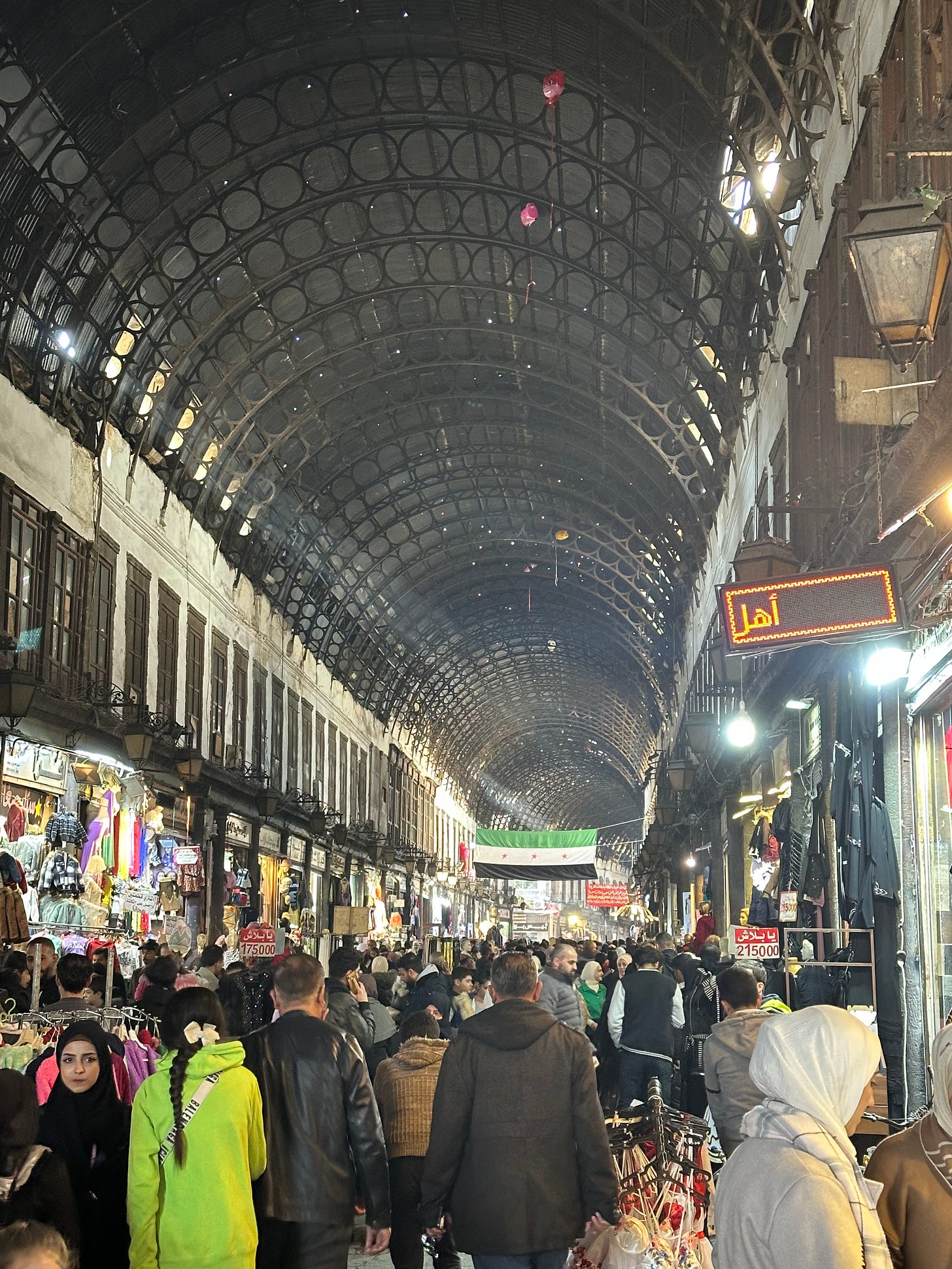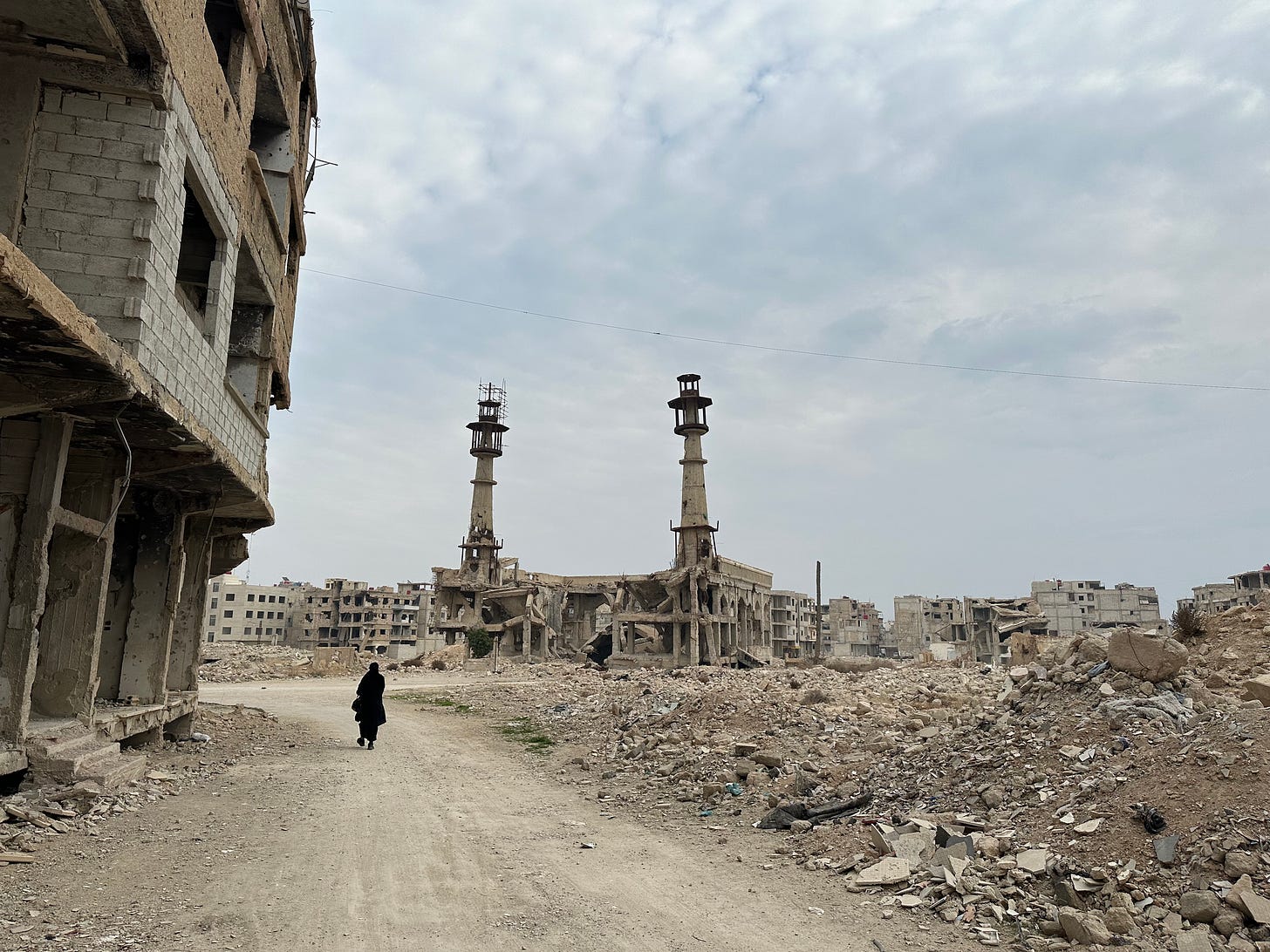In late January, I traveled with a colleague by land across the Jordanian border into neighboring Syria, still reeling from a revolution that had toppled the six-decade old Assad dictatorship. It was a journey I was sure I would never take. I had written critically about the previous government, and was almost certainly banned from the country as a result of that. Accordingly, for me, the entire trip had an element of surreality from the beginning. That uncanny feeling only got stronger the closer I got to actually entering the country.
After waiting for hours to clear the Jordanian side of the border, when I finally reached the Syrian border crossing I was met by a buoyant chaos that I had last encountered in revolutionary Egypt in 2011. The crossing was plastered with painted signs of the new Syrian flag. The once-ubiquitous faces of Assad and his father were nowhere to be seen, nor did I see their posters even once in my later travels in the country.
At the border, I had been expecting to see officials of the old regime, albeit operating with new bosses. Instead, it was clear that it was only the new management in charge here. None of the border officials wore uniforms. Most of them, including the teenage guards armed with assault rifles, were from the countryside of Idlib, and themselves seemed somewhat bewildered to be in this position. After waiting in a short queue in a marble-floored border terminal, while anti-Iranian songs played on a television in the background, I was greeted by a smiling border official dressed in a grey sweater and slacks. He asked if I was happy to be here, confusedly looked for a place to stamp my American passport, and then waved me into the country.
When I visited Ukraine last year, I discovered that it’s almost possible to forget the war exists if you avoid the front lines. That is simply not the case in the Syria. The catastrophe that Syrians experienced is palpable on every inch of their scarred country, and clear from the first moment that you cross the border. Destroyed buildings dot the side of the road to Damascus, along with people selling gasoline out of repurposed plastic bottles. Every building, even those spared direct shelling, evinces decay and ruin, as a result of the incredible poverty that has gripped the country since 2011. The ancient taxicab that we waved down once we reached the outskirts of town was missing door handles and even the interior panelling on its roof. A suffocating smog blankets the city, making even walking outside for short distances a difficult and unpleasant task. No credit cards work anywhere in Syria. Foreign currency is literally changed on street corners by solitary men who now work as de facto money exchanges. I received a gigantic stack of bills worth roughly one million pounds for a single $100 USD note.
Tragically, given Syria’s legendary cuisine, much of the food in the country today is poor quality or simply inedible. Due to a years-long energy crisis, Syria cannot maintain a refrigerated supply-chain, which means that food often spoils. Additionally, poverty and an inability to import foodstuffs under sanctions has meant that whatever food is available is often made of the lowest-grade ingredients. Those who are lucky enough to even afford food are thus often sick as a result of this situation.
Due to a near-total lack of electricity, downtown Damascus goes utterly dark at night, making it difficult to even navigate the streets as a pedestrian. Noticing all the small ways in which life in Syria simply no longer functions, and how this adds up to a generalized misery, underlined anew to me how much we take for granted in our own societies. Even sleepy Amman later seemed to me like a glittering paradise in comparison.
I spent roughly a week in Damascus. What I saw was a city and a people that had suffered unbelievable oppression and destruction, yet whose culture of kindness, dignity, and resilience had not succumbed under this pressure. The urban downtown and old city today are not places of tourist charm, but hardscrabble and impoverished neighborhoods that are also teeming with new migrants from every part of the country. Weapons are ubiquitous, though they appear to be only in the hands of the new government. Hayat Tahrir al-Sham militants and intelligence agents are visible throughout the city doing security patrols, or sometimes simply touring around and taking photos themselves. I spoke with many of them, and found those tasked with patrolling and doing guard duty with old AK-47s to be mostly shy teenagers.
Beyond downtown Damascus, the suburbs of Yarmouk, Douma, Darayya and Jobar, names that became infamous bywords for cruelty and destruction during the war, are today apocalyptic wastelands that defy description. The destruction is hard to comprehend, and the sheer scale far outstrips anything I have seen in any other conflict. You can drive endlessly in Darayya and see nothing but bombed out buildings, many of them ripped in half or simply flattened by explosions. Stray dogs hunt for food in the rubble, while shell-damaged schools and mosques, many of them lacking even walls after being looted for wiring by the Syrian military, stand out like ghostly apparitions in the landscape. Many of these destroyed areas, who destruction resembles that of the Gaza Strip, are mere walking distance from the center of Damascus, where the government officials who had ordered this destruction were once based.
There are people still living in the ruins of these areas. They live without electricity, water, telecommunications, or any of the other basics of human life. We spent quite a bit of time speaking with people in the destroyed remnants of Darayya and Yarmouk in particular. What stood out about them was the incredible dignity, kindness, and lack of bitterness that these survivors of Assad’s war displayed. We met people who were feeding those even poorer than them out of what remained of their homes and businesses, and who sent their children to school every day, no matter how makeshift or remote the facility. These were the people who had survived the onslaught. They were relieved that the government with its daily demands for bribes and threats of further violence had gone, and now they simply wanted to rebuild their lives.
Syrians politely showed us the ruins of their old homes, smiling for photos in front of the wreckage, and made us feel welcome there with them in this apocalyptic landscape. I saw entire families living in burnt out shells of buildings. Along with their hospitality, what was incredible was that even with no resources, and an urban landscape suitable to Mad Max, they and their children all dressed with immaculate cleanliness. It was completely safe even amid great poverty and desolation. Even cab drivers, for whom we could have been an easy payday, simply refused to rip us off – even advising us to walk when they knew that our requested destination was close by. No matter what had been visited upon the Syrian people, it was clear that they never lost their dignity. That resilience is the mark of a deeply-rooted culture not dependent for its existence on material wellbeing, and which did not break even after decades of horrific tyranny and violence.
Unlike in the past, in Syria today it is possible to speak to ordinary people about politics. At the same time, there is the old tinge of fear that occasionally creeps in – as though a question may somehow contain a veiled threat. In some cases, people we spoke to initially expressed fears that the regime may somehow still come back and punish them for their words. The trauma of dictatorship has left a mark on Syria, and, along with a general exhaustion from the war and economic deprivation, there are also deep anxieties about what the future may bring.
Many Syrians I spoke with expressed the fear that their country could soon be partitioned by foreign powers, or that a new war would soon break out between HTS and Kurdish-led militants in the north. Damascene Christians warmly welcomed us into a church and expressed optimism about a future after Assad, yet expressed concern about the influx of unfamiliar new faces in their city. Sunnis living around the Shia shrine of Sayyida Zeinab stated that it was a source of pride for them to be its custodians, even after the Shia militants that had once populated the area had fled, vowing that they would protect the holy site against threats from jihadists. Behind the clear relief and jubilation over the fall of Assad, there is a feeling of tension and uncertainty about what comes next.

The threat of a new civil war in Syria continues to linger, while the path back to economic wellbeing has not become any clearer. It will take a tremendous effort to hold together, let alone rebuild, a country that is still wracked by low-level violence, ethnic division, and the unsettled scores of a brutal decade-plus civil war. The social fabric and material infrastructure of Syria have been destroyed on a profound level that will take generations to remedy. It will also require borderline miraculous good luck and capable leadership to steer the country back to stability, save prosperity. One can only hope that the right combination of wisdom and fortune is now operating on their side.
I will always consider myself a friend to Syria and the Syrian people. No event shaped my worldview as much as watching the horrific conflict in Syria play out over a decade, and none has done more to reawaken a sense of optimism and possibility than watching them finally triumph against impossible odds and free their country. In the end, when their cause had been deemed finished, and they were even being implored to accept their tormentors, Syrians defied the world and took their fate back into their own hands. No one can see this and not be inspired, regardless of how hard a road they may face today.
In the Quran its written, “verily with hardship comes ease.” After disappearing for decades under the suffocating yoke of dictatorship, my only wish is to see Syrians now return to claim their proper place in history. They have certainly earned it.






Beautiful story.
A lot of young Syrian guys cross through the Turkish border to either pass through or stay in Bulgaria. I love hanging out with them. It's some skinny kid that looks like he plays video games all day and trolls on 4chan or whatever Superior Western young men do these days and then he'll be like, "I work 17 hour days in construction to support my whole family even though the shrapnel in my body still hurts." They don't know English or Bulgarian (because the fucking EU spends its money bribing Bulgaria to push them back at the border instead of language classes), they regularly have their wages stolen, people are racist, they have no idea where they'll end up, but they're SO cheerful and optimistic and fun. To everything, "No problem, no problem!"
Thank you for sharing your impressions, including present severe hardships along with the grace and patience of the people that you met. I wonder how long this patience will last in the absence of tangible improvements to the quality of life.